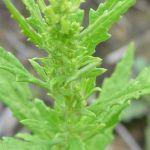| Common Name: |
Epazote |
| Other Names: |
,Mexican Tea, Pigweed, Wormseed |
| Botanical Name: |
Chenopodium ambrosioides |
| Genus: |
Chenopodium |
| Family: |
Chenopodiaceae |
| Native Location: |
Tropical America; widely naturalized in the tropics and subtropics. |
| Cultivation: |
Rich, well-drained soil in sun. Pinch out tipss to encourage bushiness. |
| Propagation: |
By seed sown in spring. Self-seeds freely, even in temperate regions. |
| Harvest: |
Plants are cut in autumn for oil, or dried for liquid extracts and powder. Leaves are picked as required and used fresh. |
| Height: |
1.2m (4ft) |
| Width: |
75cm (30in) |
| Hardiness: |
Hardy |
| Parts Used: |
Whole plant, leaves, oil, Berries/Fruits, Roots |
| Chemical Constituents: |
Ascaridol
Calciun
Cymene
D-camphor
Limonene
Saponin
Terpene
Vitamins A and C
Volatile Oils
|
| Properties: |
An acrid, astringent, strongly aromatic herb that destroys intestinal parasites, increases perspiration, and relaxes spasms. It also has expectorant, anti-fungal, and insecticidal effects. |
Known Effects: |
Inhibits growth and development of germs
Decreases blood pressure
Decreases heart rate
Depresses central nervous system
Decreases stomach contractions
Miscellaneous Information:
Wormseed is used externally as a poultice.
|
| Possible Additional Effects: |
May treat arthritis
May kill intestinal parasites
|
| Medicinal Uses: |
Internally for roundworms, hookworms, small tapeworms, amebic dysentery, asthma, and excess mucus. Not given to pregnant women. Excess causes dizziness, vomiting, convulsions, and death. Externally for athlete's foot and insect bites. |
| Culinary Uses: |
Leaves flavor corn, beans, mushrooms, seafood, fish, soups, and sauces. |
| Economic Uses: |
Used as a fumigant against mosquitoes and in fertilizer to inhibit insect larvae |
| Warnings and Precautions: |
Skin allergen. This herb is subject to legal restrictions in some countries.
Don't take if you:
Are pregnant, think you may be pregnant, or plan pregnancy in the near future.
Have a chronic disease of the gastrointestinal tract, such as stomach or duodenal ulcers, reflux esophagitis, ulcerative colitis, spastic colitis, diverticulosis, or diverticulitis.
Consult your doctor if you:
Take this herb for any medical problem that doesn't improve in 2 weeks. (There may be safer, more effective treatments.)
Take any medicinal drugs or herbs including aspirin, laxatives, cold and cough remedies, antacids, vitamins, minerals, amino acids, supplements, other prescription or non-prescription drugs.
Pregnancy:
Dangers outweigh any possible benefits. Don't use.
Breastfeeding:
Dangers outweigh any possible benefits. Don't use.
Infants and Children:
Treating infants and children under 2 weeks with any herbal preparation is hazardous.
Others:
None are expected if you are beyond childhood, under 45, not pregnant, basically healthy, take it for only a short time and do not exceed manufacturer's recommended dose.
Storage:
Store in cool, dry area away from direct light, but don't freeze.
Store safely out of reach of children.
Don't store in bathroom medicine cabinet. Heat and moisture may change the action of the herb.
Safe Dosage:
Consult your doctor for the appropriate dose for your condition.
|
| Toxicity: |
Rated slightly dangerous particularly in children, persons over 55 and those who take larger than appropriate quantities for extended periods of time. |
| Adverse Reactions, Side Effects, or Overdose Symptoms: |
| Signs and Symptoms |
What to do |
|
| Breathing difficulties |
Seek emergency treatment |
| Drowsiness |
Discontinue. Call doctor when convenient. |
| Headache |
Discontinue. Call doctor when convenient. |
| Hearing problems |
Discontinue. Call doctor immediately. |
| Nausea and Vomiting |
Discontinue. Call doctor immediately. |
| Ringing in ears |
Discontinue. Call doctor when convenient. |
| Slow heartbeat |
Seek emergency treatment. |
| Stomach ulcers |
Discontinue. Call doctor immediately. |
| Vision problems |
Discontinue. Call doctor immediately. |
|
| Bibliography: |
Encylopedia of Herbs by Deni Brown Copyright ©: 1995, 2001 Dorling Kindersley Limited pg. 166
Vitamins, Herbs, Minerals & Supplements The Complete Guide by H. Winter Griffith, MD Copyright©1998 Fisher Books.465-466 |

